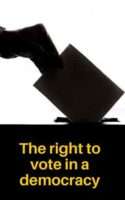Anti-democratic political rivalry: In KwaMashu in KwaZulu-Natal political rivalry has lead to threats, campaigners being attacked and their cars burnt, and even several deaths. The three main parties contesting there are the African National Congress (ANC), the Inkatha Freedom Party (IFP) and the National Freedom Party (NFP). On April 8th President Jacob Zuma of the ANC responded in a speech: “Everyone has a right to support a party of their choice. That is the freedom we fought for.” Read more here.
Fighting for media coverage: In every election competing political parties try to be in the news and show media adverts so voters know who they are, and can be persuaded to vote for them. This needs a lot of preparation and costs a lot of money. In the weeks leading up the May 2014 elections, the Democratic Alliance (DA) and the Economic Freedom Fighters (EFF) aired hard-hitting television and radio adverts that were critical of the ANC under President Jacob Zuma. The national broadcaster, the SABC, stopped the adverts from being aired, claiming that they would ‘incite violence’. Both parties said this was unfair. The DA took the matter to the Independent Communications Authority of South Africa (Icasa). They won the right to carry on showing the adverts.
Objecting to candidates: Political parties have to register and publish the names of all their candidates. Anyone, or another party or organisation, can object to the candidates. In 2014 the IEC investigated 45 objections, but agreed to only one. That candidate had been convicted of a crime and had spent more than 12 months in jail without the option of a fine. The law says that such a person can only stand for election five years after finishing the jail sentence. The person was disqualified.
Extending the voter’s roll: In the 2014 elections there will be two new groups of voters: prisoners, and people living or working in other countries. The Electoral Amendment Bill 2013, says that citizen prisoners in South Africa, and citizens living in other countries have the right to register and vote in elections. This means the IEC has to make special arrangements because polling booths must be set up in over 200 correctional facilities (prisons), and in embassies.
‘Strategic voting’ campaign: A controversial, unexpected campaign has shaken up the 2014 elections. This “Sidikiwe Vukani! [We are fed up! Wake up!] Vote No” campaign was launched by some well-known ANC members to get voters to spoil their ballots or vote for smaller parties (not the official opposition DA).They want to send a message of discontent to the current ANC. They say this is better than people boycotting the election, and that it is for the good of the ANC. (see link below for the ANC response)
‘Food parcels for votes’: Both the DA and Agang have complained to the Public Protector, Thuli Madonsela, that the ANC has been handing out food parcels, organised by the Department of Social Development, at political rallies. They say this is illegally using state resources for campaigning. The DSD replied that it is just helping the poor. You can read more about it here.


